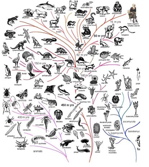Reading on: Reactions to the new naturalism
Hofstadter, Richard Social Darwinism in American Thought George Braziller, New York 1955 [abridged – 300 words] — the influence of the theory of evolution
Many scientific discoveries affect ways of living more profoundly than evolution did; but none have had a greater impact on ways of thinking and believing.
In this respect, the space age does not promise even remotely to match it. Indeed, in all modern history there have been only a few scientific theories whose intellectual consequences have gone far beyond the internal development of science as a system of knowledge to revolutionize the fundamental patterns of thought.
Discoveries of this magnitude shatter old beliefs and philosophies; they suggest (indeed often impose) the necessity of building new ones. They raise the promise—to some men infinitely alluring—of new and more complete systematizations of knowledge. They command so much interest and acquire so much prestige within the literate community that almost everyone feels obliged at the very least to bring his world-outlook into harmony with their findings, while some thinkers eagerly seize upon and enlist them in the formulation and propagation of their own views on subjects quite remote from science.
The first such episode in modern times, the formulation of the Copernican system, required a major revision of cosmologies and opened up to learned men the fascinating and terrifying prospect that many long-received ideas about the world might have to be drastically revised. Once again, in the Newtonian and post-Newtonian eras, mechanical models of explanation began to be widely applied to the theory of man and to political philosophy, and the ideal of a science of man and of society took on new significance.
Darwinism established a new approach to nature and gave fresh impetus to the conception of development; it impelled men to try to exploit its findings and methods for the understanding of society through schemes of evolutionary development and organic analogies.


